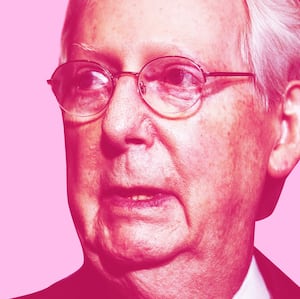“I can’t believe the Republicans will let the nation default” by not raising the debt limit, Senate Majority Leader Chuck Schumer recently asserted at a news conference, accompanied by House Speaker Nancy Pelosi.
Schumer’s rhetoric is pure partisan gaslighting. After all, Democrats control the White House, Senate and the House of Representatives. They could have raised the debt limit by themselves without needing a single Republican vote.
All the Democrats had to do was include debt limit instructions in either of the two budget resolutions that they passed this year. This would have allowed them to attach an increase in Washington’s borrowing authority to the reconciliation bills—which are not subject to filibuster and thus can pass the Senate with only the 50 Democratic votes. Republican opposition would be irrelevant, as they would be powerless to stop the Democrats.
But Schumer rejected calls to set the debt limit legislation at a 50-vote threshold. Instead, he moved it to regular legislation that requires 60 Senate votes to overcome a filibuster—and then blamed Republicans for not meeting this higher vote threshold.
Schumer surely concluded that some of his fellow Democrats are hesitant to vote for a debt limit increase—and he did not want to risk their opposition bringing down the entire must-pass reconciliation bill. Moving the debt limit to regular legislation with a 60-vote threshold allows Schumer to deflect attention from his own party’s hesitancy, and instead blame Republican senators for not bailing his party out.
But why would Republicans supply the votes for a Democratic priority that the Democratic majority steadfastly refuses to pass by itself? Legislation to raise the debt limit is unique as a must-pass bill whose unpopularity leaves neither party wanting to vote for it. Thus, the burden of passing this legislation has long fallen on the House and Senate majority parties that run the Congress, decide which bills receive a vote, and (by simple math) must supply many of the votes for any bill that passes. The minority party has little incentive to supply bipartisan cover for this unpopular vote, so they typically (and cynically) vote no.
And both parties play this game. During the George W. Bush presidency, there were three times in which a fully Republican-controlled government had to raise the debt limit. House and Senate Democrats cumulatively voted against these bills at a 98.8 percent rate. Schumer and Pelosi voted against each of those debt limit hikes, as did then-Senator Barack Obama. When the Democrats took Congress in 2007, the parties essentially reversed their votes on the debt limit.
Later, during the Obama and Trump presidencies, securing a bipartisan debt limit vote typically required giving the minority party some key policy priority within the legislation. During the 2011 debt limit standoff, both parties agreed to cut the other side’s favored spending programs. Later, the GOP Congress secured Democratic support by attaching the debt limit to big spending bills. However, the last time a fully GOP-controlled government had to raise the debt limit—in February 2018—a majority of House Democrats (including Pelosi) voted no even despite the $300 billion in popular spending hikes attached to the bill. (Most Senate Democrats voted yes, with the exception of leading progressives).
In short, every time this century that Republicans have had full control of the White House and Congress, Democrats have overwhelmingly voted against raising the debt limit unless it was attached to legislation that contained significant liberal priorities. And as recently as 2018, even those liberal policies were not enough to win over most House Democrats.
Yet these same Democratic leaders—taking their turn controlling the White House and Congress—now slam Republicans for holding the same skeptical policy on the debt limit that Democrats consistently hold whenever in the same minority position. This is as brazenly hypocritical as Senate Democrats spending the past six years enthusiastically filibustering hundreds of Republican bills, and then suddenly declaring the filibuster to be illegitimate as soon as they took back the Senate majority.
To recap: Congressional Democrats could have raised the debt limit themselves in reconciliation. They chose to avoid taking this unpopular vote, and now are demanding that congressional Republicans bail them out instead at their own considerable political risk. And Democrats are demanding that GOP lawmakers provide these votes with nothing in return, which these same congressional Democrats consistently refuse to do themselves when in the minority.
It is easy for liberal readers to dismiss all this “petty politics” and assert that Republicans should stop playing tit-for-tat and “do the right thing,” Sure enough, both parties will eventually work out a debt limit solution as they always do. Still, these critics would have more credibility if they also held accountable the congressional Democrats who regularly employ the very same tactics when in the minority. Otherwise, this selective outrage is just standard political hypocrisy.
Politics aside, nearly all lawmakers concede that the debt limit must be raised. Failing to do so would require that Congress immediately balance the budget by eliminating half of all federal spending – likely slashing Social Security, interest payments on the national debt, payments to state and local governments, and reimbursements to businesses working with the federal government. Financial markets would panic, and demand higher interest rates for government bonds—permanently raising federal borrowing costs.
But just like Democratic congressional minorities, a GOP minority will not give away their debt limit vote for free. And the best approach is to raise the debt limit—and ensure that Washington can pay its bills—while responsibly addressing the unsustainable borrowing that the debt limit exists to address.
Here is a little-known fact: Since 1985, virtually every major deficit reduction law has been attached to a debt limit increase. The 1985 and 1987 Gramm-Rudman-Hollings deficit caps were attached to debt limit bills. So were the 1990, 1993, and 1997 budget deals that contributed to the 1998-2001 balanced budgets. The 1996 Line-Item Veto Act (later invalidated by the Supreme Court) and 2010 Pay-As-You-Go law were each placed on debt limit bills. Most importantly, the 2011 Budget Control Act—and its $2.1 trillion spending cut—was attached to a debt limit bill. Recent Democratic congressional minorities have held the debt limit ransom for spending increases. Republicans should return to the tradition above by demanding spending cuts. This would align with the spirit of the debt limit, which is to hold lawmakers accountable for skyrocketing debt.
For instance, Congress could attach Sen. Mitt Romney’s TRUST Act, which would create bipartisan congressional commissions to guarantee the long-term solvency of the Social Security, Medicare, and highway trust funds. More than 70 senators have signaled support for the TRUST Act, and it has been endorsed by a bipartisan coalition of 60 House members.
Alternatively, Congress could agree to limit the size of the upcoming reconciliation bill. Or lawmakers could ban popular budget gimmicks that allow them to evade budget rules. They could even attach legislation ending government shutdowns by automatically renewing expired appropriations at current spending levels.
Because default should never be a realistic option, Congress should eventually consider replacing the debt limit with a new system of spending caps or deficit-reduction targets to counteract the federal budget system’s built-in bias in favor of soaring spending and deficits.
Both parties understand the debt limit must be raised. But if Democrats are going to refuse to pass it themselves and demand that Republicans provide the final votes instead, they will need to offer the GOP something in return. Even modestly addressing the underlying (and soaring) debt is a commonsense solution.







